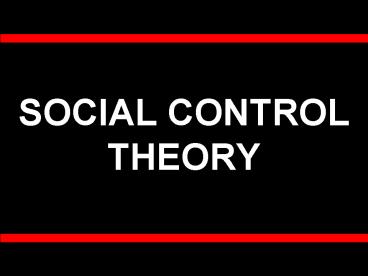SOCIAL CONTROL THEORY - PowerPoint PPT Presentation
1 / 17
Title:
SOCIAL CONTROL THEORY
Description:
A divorced man is more likely to commit deviant acts (suicide or forgery) ... and conscience when divorced, and studies show more deviant acts are likely to ... – PowerPoint PPT presentation
Number of Views:1105
Avg rating:3.0/5.0
Title: SOCIAL CONTROL THEORY
1
SOCIAL CONTROL THEORY
2
Why are you NOT delinquent?
- According to Control Theorists, people do not
engage in delinquency because of the controls or
restraints placed on them.
I know the difference from right and wrong.
My family would be very disappointed.
I have many plans for the future and delinquency
may hinder or destroy my future.
3
COMPARISON TO SOCIAL LEARNING THEORY
- Social Learning looks at what causes and what
prevents delinquency - Social control looks at how different types of
sanctions prevents delinquency - Delinquency is largely a function of differences
in the level of control (According to Control
theorists)
4
MAJOR TYPES OF CONTROLBy Agnew
- DIRECT CONTROL
- STAKE IN CONFORMITY
- INTERNAL CONTROL
5
DIRECT CONTROL
- Setting rules
- Monitoring the juveniles behavior
- Sanctioning the juvenile for rule violations and
delinquency - Reinforcing the juvenile for conventional
behavior
6
STAKE IN CONFORMITY
- Emotional attachment to conventional others
- Actual or anticipated investment in conventional
activities
7
INTERNAL CONTROL
- Beliefs regarding delinquency
- Ability to exercise self-control
8
Article Parental and Peer Influences on the Risk
of Adolescent Drug Use
- Purpose Adolescent relationships with parents
and peers correlation with drug use. - Variables Attachment to father
- Attachment to mother
- Parental monitoring
9
- Results
- Attachment to Mother
- Cigarette use, Marijuana use, Illicit drug use
- Attachment to Father
- Alcohol use, Binge drinking, cigarette use
- Parental Monitoring Alcohol use, Binge
drinking, cigarette use, Marijuana use, Illicit
drug use
10
- Data was more consistent with Social Learning
Theory than Social Control - Parental Monitoring was found to be the most
important social control variable (of 3 tested) - Negative association between parental monitoring
and having friend who used drugs
11
HIRSCHISOCIAL BOND THEORY
- ATTACHMENT
- COMMITMENT
- INVOLVEMENT
- BELIEF
12
ATTACHMENT
- To violate a norm is to act contrary to the
wishes expectations of others. If one does not
care about the wishes of others he is not bond to
the norms and there is no attachment and is more
likely to be deviant. - Ex. A divorced man is more likely to commit
deviant acts (suicide or forgery). He lost his
attachment and conscience when divorced, and
studies show more deviant acts are likely to take
place. - Theorists suggest attachment to any object
outside self, for example home, religion or
family pets promotes moral behavior.
13
COMMITMENT
- If a person invests time, energy, himself in a
certain line of activity (education, business,
athletics) then they must think of the risk of
losing what they committed to. A deviant act is
less likely to occur because of this fear of
losing it. Committed to conformity - One also must be aware of not only the risk of
what they will lose but also what they hope to
obtain.
14
INVOLVEMENT
- People are to busy doing conventional things to
find time to engage in deviant behavior. They
have to many obligations such as appointments,
deadlines, work hours and so on. Involvement in
conventional activities is a major deterrent to
delinquency. Deviant acts are much more likely
to happen when a juvenile is not supplied or
offered the opportunity to satisfy their
recreational interest. (facilities, money etc.)
15
BELIEF
- Many do not have an attitude of respect towards
the rules of society. No moral obligation, so
their beliefs and values are constant with
feelings. The less a person believes in the rules
of society, the greater chance a person will
violate them.
16
QUESTION
- Who or what is more important for control of
delinquency, father or mother, family or school?
17
(No Transcript)































